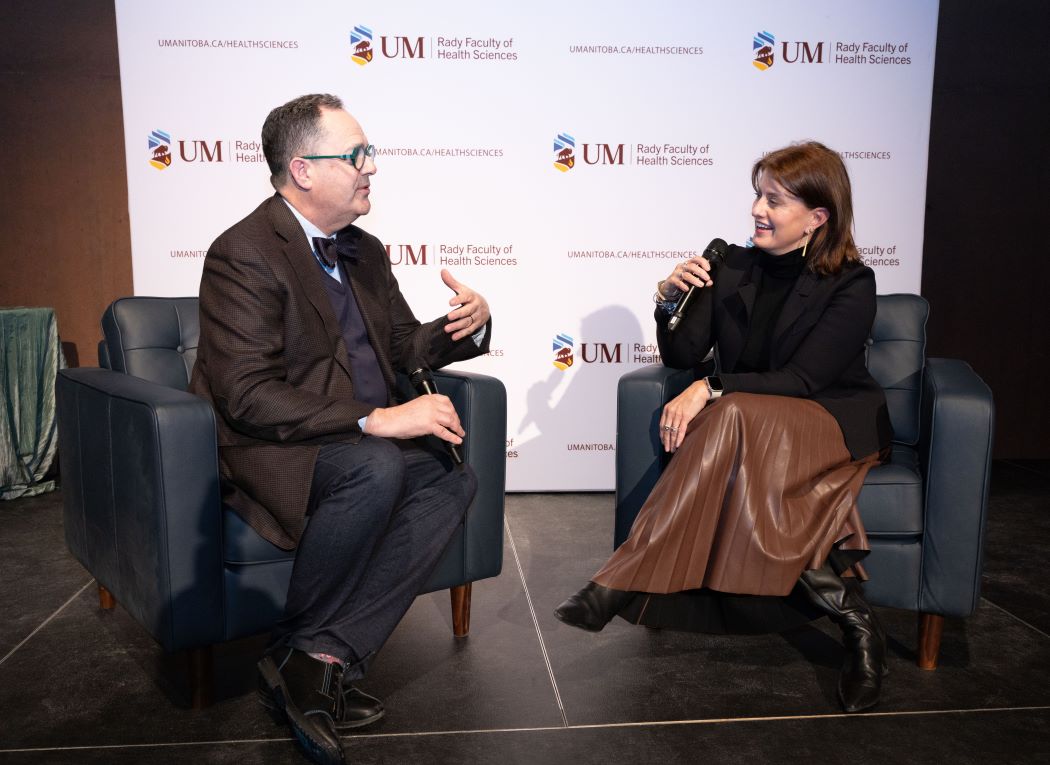February 28, 2025 —
Today’s medical students are extraordinary individuals with great capacity to contribute as physicians, but the health-care system must change to support them in achieving their best, a distinguished medical alum said at a recent UM awards dinner.
Dr. Kathryn Tinckam, who earned her medical degree at UM in 1997, is a kidney transplant specialist who is now physician-in-chief at Toronto’s University Health Network (UHN), Canada’s top research hospital.
She was the guest speaker at the Max Rady College of Medicine’s 15th annual Teacher Recognition and Manitoba Medical Students’ Association Awards evening on Feb. 26 at the Canadian Museum for Human Rights.
The audience was made up of more than 160 medical students, teachers, faculty and deans.
Tinckam spoke in a question-and-answer format with one of her mentors, Dr. Peter Nickerson, dean of the Max Rady College of Medicine and the Rady Faculty of Health Sciences.
Today’s physicians-in-training aren’t just passionate about medical excellence, Tinckam said. They understand the social determinants of health and feel a responsibility to be social advocates.
“What worries me is what we’re asking of them … in a world that is increasingly under duress, where our health-care system is under strain, where we’re seeing increasing rates of physician burnout….
“I want to make sure that we look at our next generation of physicians … and we protect them so that they can have fulfilling, meaningful careers … and we continuously challenge ourselves to redesign the system so they can be successful.”
In addition to serving as physician-in-chief at UHN, Tinckam is a professor of medicine and laboratory medicine at the University of Toronto. She has held many leadership roles in the National Transplant Program at Canadian Blood Services.
She became somewhat of an “accidental leader,” she recalled, because she was a problem-solver who kept being asked to tackle bigger problems.
Along the way, she recognized that she needed to look beyond health care for guidance on solving big-system challenges. “Leadership is not just the job,” she said. “It’s the learning that goes along with it, and the expertise that you have to develop.”
Realizing that her medical training hadn’t given her all the skills to drive system change through quality assurance and improvement, Tinckam recently completed an MBA. She encourages other health-care professionals to seek out business-style tools for leadership.
“The knowledge that I was getting was immediately applicable,” she said. “I was halfway through my MBA, and I was taking what I was learning in business operations and immediately implementing it.”
Coming home to UM as a speaker, Tinckam said, renewed her appreciation for her medical education and for the strong sense of community at the medical college.
“You are getting a phenomenal medical education,” she told the students in the audience. “There is something very, very special about this medical school. It is big enough to have world-class science, world-class educators, some of the leaders in the field, but it’s small enough to connect students directly with those people.
“I think what is amazing when you’re watching the celebrations tonight is how close the learners are to their teachers.… It is truly unique.”
The awards evening included the presentation of 21 Teacher Recognition Awards, voted on by medical students to honour teaching excellence in categories such as innovation, inspiration, mentorship, patient advocacy and small-group teaching.
Four awards were also presented to medical students who have distinguished themselves in the categories of citizenship, global health, community service and leadership.
The teaching and student award winners are listed on the Max Rady College of Medicine website.
Watch an Instagram Reel recapping the awards evening.
link

